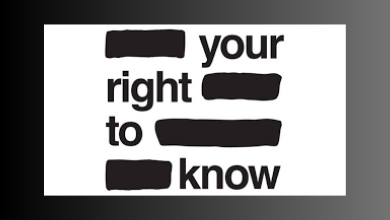Freedom of information – your right to know
Your right to know is strongly supported by Freedom of Information laws that allow people to access their personal records to ensure they are not incomplete, incorrect, out of date or misleading.
Freedom information laws were developed by government for a number of reasons. First, to promote openness in government and accountability of government agencies to enhance the respect for the law. Secondly, to facilitate more effective participation by the public in law making and government administration.
It is logical, therefore, to assume that any person in government who is against the Freedom of Information processes are themselves against the law, against government accountability and against public participation in law making and administration of government. Government staff who abuse their power are particularly hostile toward people exercising their right to information.
Why is FOI important?
Your right to know exactly what information governments hold about you is important. Government decisions are based on such information. The person subject to a decision often does not know of the existence or content of such records. If the records are incomplete, incorrect or misleading, then any decision made with consideration to the records will likely be faulty.
People who are subject to decisions that do not seem right will likely find the cause through the FOI process. Once the cause is identified, steps can be taken to challenge or correct the decision.
How to access Freedom of Information
Each state, territory and the Commonwealth has their own FOI legislation. This means the process to access information may vary slightly in each jurisdiction. However, these process are fairly similar and provides similar rights to access information.
Applications in states and territories can be made either by online forms (provided on government websites), by official forms provided online for printout, or by letter. Applications are made to the Freedom of Information office of the particular agency from which information is sought.
Fees for applications are around $41.00 per application. People in financial hardship and/or on government concession can usually obtain a fee waiver. Commonwealth applications are usually free.
Tips for making applications
There are some methods that may need to be followed when applying for information under FOI laws. Applications for information are actually applications for documents. It is therefore important to specify or describe the particular document or documents that you require when making an application.
Relevant dates in which the documents were published also need to be stated. Furthermore, a person cannot ask for too many documents in one application, nor for too many pages at one time (often limited to around 160-200 pages). Because of limitations on amount of pages, multiple applications may need to be made. There is no limit to the amount of applications a person can make.
Example: if a person in prison requires information about themself held by prison authorities, they should not simply ask for ‘all information about me’. A valid application may state ‘all case notes recorded against me between 01 January 2022 and 31 December 2023.’ A second application may requests ‘all case review reports and documents considered in those case reviews for case reviews held on me between 01 January 2022 and 31 December 2023’.
What documents do agencies keep?
It can be a little tricky attempting to work out exactly what records an agency may have. Sometimes it can be a matter of trial and error in making applications to get all the information they have. A person will not be charged for invalid applications. Furthermore, if an applicant does not know the specific document names, they can explain what type of information they are seeking and the agency is required to assist the applicant in locating all the relevant documents containing that information.
If a person doesn’t know the name of the document, agencies are required to assist applicants in identifying the document. Helpfulness of assistance may vary.
Links to online FOI info and application forms
See the following links for information on FOI processes in your jurisdiction.
Like all legal processes, these processes may seem difficult to navigate at first but will become easier when repeated. Patience and persistence may be the key to identifying the documents you require. Contact Level Up for further information about Freedom of Information processes.
Please note: The information provided is of a general nature only and should not be relied upon as legal advice. You should not rely upon, nor act solely on the basis of the material contained on this website. If you are unsure about your rights and obligations, Level Up recommends that you seek independent legal advice.

